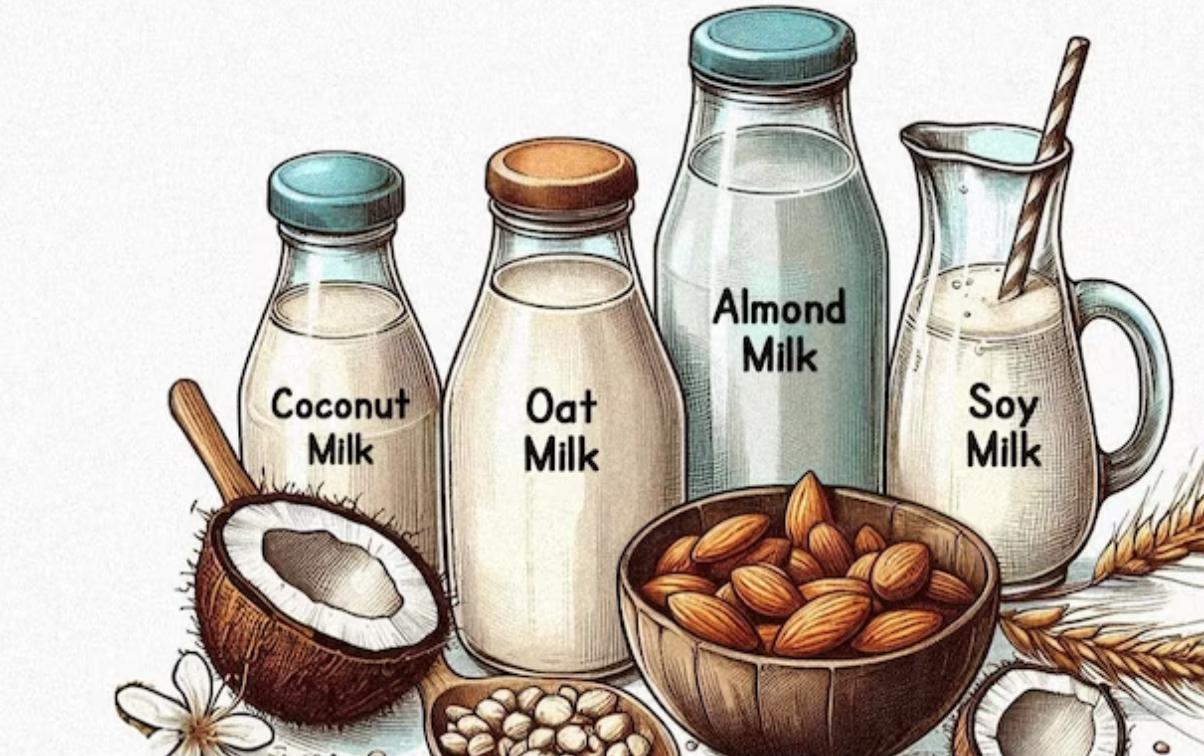Cow milk, nut milk, this milk, that milk: How to choose the right milk for you
Almost every child while growing up had a love-hate relationship with milk. If you grew up in an Indian household, you will remember how your mother used to run after you to make sure that the glass of milk was done and dusted. After all, milk was considered (and for some still is) a complete meal – replete with calcium, protein, vitamins and minerals.
Let’s say, even 10 years ago, we knew only two kinds of milk existed in the market – cow milk and buffalo milk. However, in the last couple of years, the market has been buzzing with numerous variants and milk substitutes and, frankly, it’s a challenge to zero in on one.
How milk substitutes invaded the market
It all started with a quest for alternatives. Lactose intolerance was no longer a whispered secret; it was a real deal. People were tired of dodging dairy-induced bellyaches, pimples and other digestive problems.
Now, what most people question is – our parents and grandparents enjoyed milk and digested it pretty well; how come our generation is facing so many hiccups?
Rohit Bhagat, business head of Life Health Foods India Pvt Ltd, summed it up perfectly.
He said:
- “Cow milk is very sacred to most of us in India as we use it to make panchamritand give it to all our children. Having said that, over the years, we humans have made a lot of changes to our diet. We have started consuming more processed food and also started eating out a lot. Hence, our gut processing abilities have changed. We have noticed that a lot of people have become lactose intolerant, which means that their gut cannot process cow milk or buffalo milk.”
- “In some cases, adulteration and animal cruelty have also forced people to turn towards plant-based beverages,” he added.
Milk substitutes currently available in the market
At this juncture, there is a plethora of milk substitutes to choose from.
- Soy milk: Made from soybeans, soy milk is a popular dairy alternative. It is often fortified with vitamins and minerals to match the nutritional content of cow’s milk.
- Coconut milk: It is made from the flesh of coconuts. It has a rich and creamy texture with a distinct coconut flavour.
- Oat milk: It is made from whole oat grains or oatmeal blended with water. It has a mild, slightly sweet taste and a creamy texture.
- Rice milk: It is made from milled rice and water. It tends to be thinner than cow’s milk and has a sweeter taste.
- Nut milk: You can pretty much conjure milk out of any nut available in the market – almonds, peanuts, hazelnuts, cashews and Macadamia. Nut milk is low in calories and can be fortified with essential nutrients such as calcium, vitamin D, and vitamin B12, making them nutritionally comparable to cow’s milk.
- How to choose milk which is best for you
- Choosing the right milk for your needs involves considering factors such asnutritional content, dietary preferences, and any potential allergies or sensitivities.
- If you are on a weight-loss journey, this is what dietician and content creator Nabaruna Ganguly suggests, “For fat loss, almond milk, soy milk and oat milkis a better choice than dairy. Almond milk contains fewer calories as well as a high amount of MUFA, a high amount of omega-3 fatty acid, no cholesterol and saturated fat. It also contains high protein and lower carbohydrates, which makes it an attractive choice for weight management.”
- “But people suffering from certain types of cancers, fibroids, thyroid disorders who need to restrict high oestrogen content food, can’t consume soy milk,” she added.
- Are you lactose intolerant? Alternatives like almond, soy, or oat milk can be the best fit. From adding it to your mandatory subah ki chai to even making gajar ka halwa with it, you can use these milk alternatives to make pretty much everything.
- In case you are someone with a heart condition, you can consider choosing low-fat or skimmed milk to reduce saturated fat intake.
- If you are diabetic, choose low-fat or skimmed milk, and monitor your carbohydrate intake. Unsweetened almond or soy milk can also be good options.
- Is cow milk really the villain?
- “Tbh, this is pretty debatable,” said dietician Nabaruna.
- “Cow milk has a good balance of protein, carbohydrates and fat as well as it consists of many essential nutrients like calcium, riboflavin, Vitamin D, iodine, potassium, zinc and 40 other nutrients, which make it a complete food.”
- However. after a certain age, people should avoid cow milk because it is a tad difficult to digest, as suggested by researchers.
- “People who have a family history of breast, ovarian and prostate cancer should avoid or limit milk consumption after a certain age,” she added
- Nabaruna further said that the problem lies with hormonal or medicine-treated cow milk which is not suitable for consumption.
- So, should we stop cow milk consumption altogether?
- Siddhant Prasad, fitness and nutrition coach, said that the consumption of the type of milk depends on the population we are focused on.
- “The prevalence of lactose intolerance in India is estimated to be around 65-70 per cent of the adult population. This is mostly due to insufficient production of lactose-digesting enzymes after early childhood. On the flip side, 75 per cent of men and 84 per cent of women consume inadequate calcium,” Siddhant told India Today.
- “I recommend one to two glasses of low-fat cow’s milk to clients who are not lactose intolerant, not because it is a protein source, but because it is a decent source of calcium and phosphorus and also a convenient mixer for whey protein, coffee, and tea,” he said.
- Dietician Nabaruna is also not in support of totally excluding cow milk from people’s diet who don’t actually have a health complication.
- “I recommend diluted cow milk as well as mostly homemade almond milk for better health benefits. Nowadays, unadulterated cow milk is difficult to find. Therefore, vegan milk is a better choice,” she said.
- Unadulterated cow milk
- So, after speaking to dieticians, nutritionists and health coaches, one thing is clear, cow milk is not the problem but the adulteration is. So, if that part is fixed, a lot of people who don’t have an aversion towards cow milk can enjoy it without a problem.
- Right now in the market, there are a lot of brands that have come up with organic and unadulterated A2 milk where the milk’s quality is not compromised.
- What sets A2 milk apart from regular milk is the protein content. A2 milk contains only the A2 beta-casein protein, steering clear of its troublemaking cousin, A1 beta-casein. Some studies suggest that A2 protein is gentler on the stomach, making it a smoother experience for those who might feel discomfort after regular milk.
- Dairy brand Whyte Farms is one such brand that promises the richness and freshness of A2 cow milk.
- “Unlike conventional dairy options, our milk is produced at our state-of-the-art farm, guaranteeing no human touch, a very short supply chain and the highest standards of quality. Our key focus is to provide the best feed for our cows that is also grown at our farm organically, which results in nutritious, high-quality milk,” Whyte Farms spokesperson said.
- “The milk is free from harmful preservatives, artificial hormones, and antibiotics, providing wholesome and natural milk and dairy products for the customers,” she added.
- “Cow milk or buffalo milk contributes to more than 98 per cent of total milk sales and will never lose their charm,” Rohit Bhagat added.
- The downside of plant-based and vegan milk
- While plant-based and vegan milk have gained popularity as alternatives to traditional dairy milk, they also have certain downsides.
- Cost: Plant-based milk can be more expensive than traditional dairy milk, depending on the brand and type. This can be a barrier for some individuals, especially those on a tight budget.
- Allergies and sensitivities: Individuals with allergies or sensitivities to certain plant foods, such as nuts or soy, may need to be cautious when choosing plant-based milk. Cross-contamination in processing facilities can also be a concern.
- Additives and sweeteners: Some plant-based milk may contain additives, stabilisers, and sweeteners to enhance flavour, texture, or shelf life. It’s important to read labels carefully and choose products with minimal additives if that is a concern.
- Older generation mindset: Older generations often grew up with traditional dairy products as a staple in their diet. Milk and dairy have been culturally ingrained, and people tend to stick to what they know and are familiar with.
- Always remember
- The best milk for you is the one that aligns with your health goals and suits your taste buds, so don’t hesitate to explore different options until you find the perfect match for your lifestyle.








